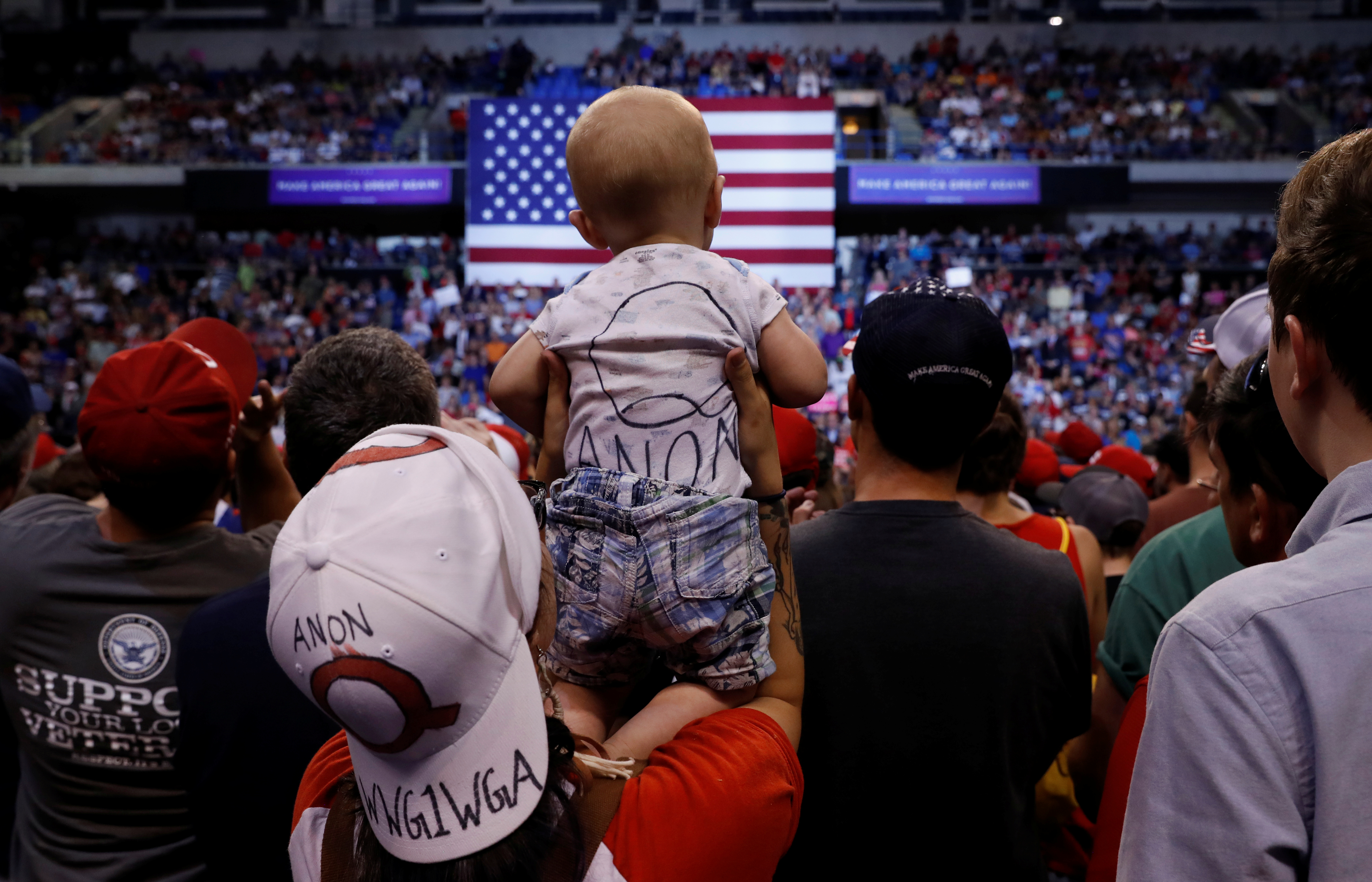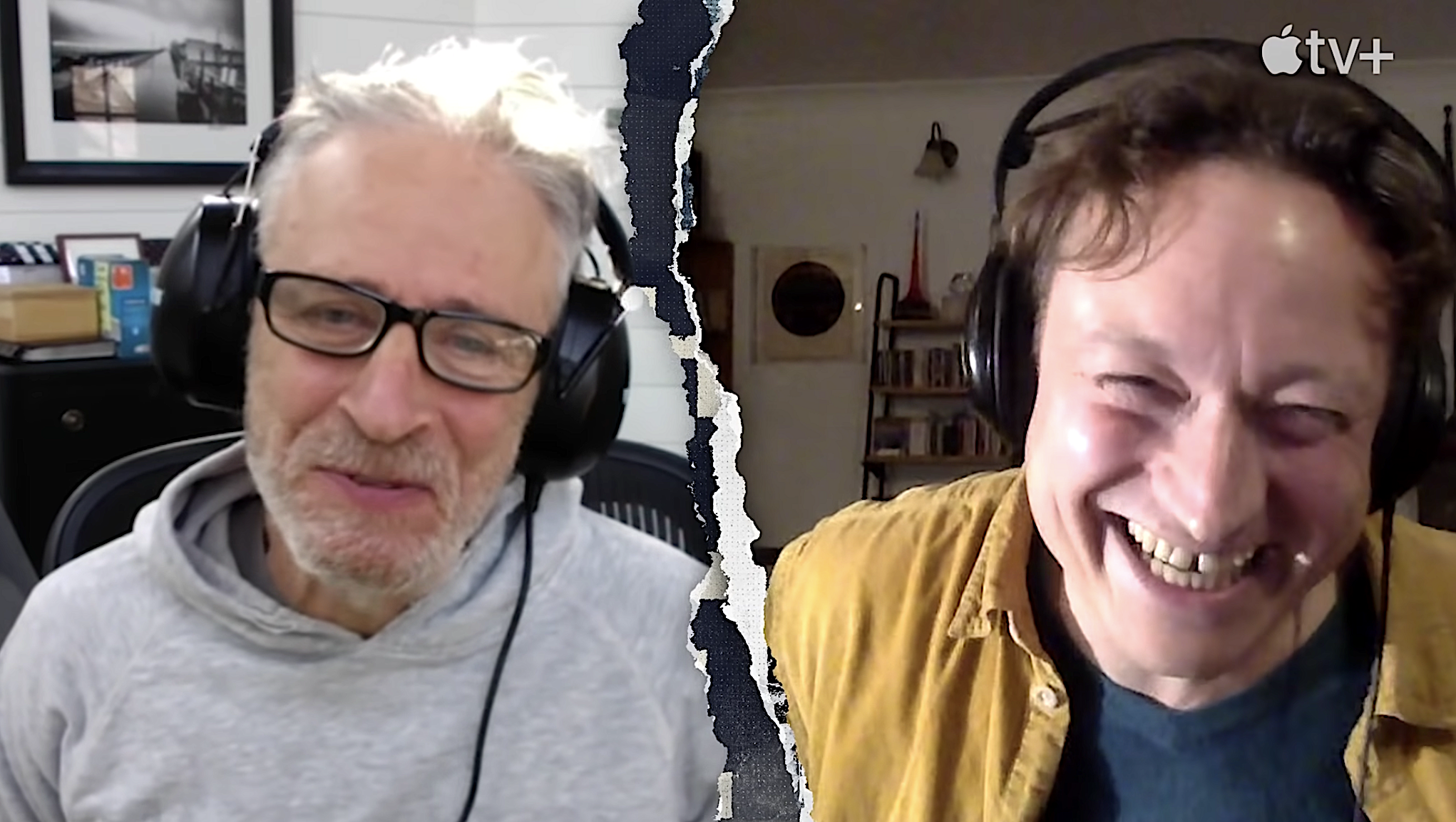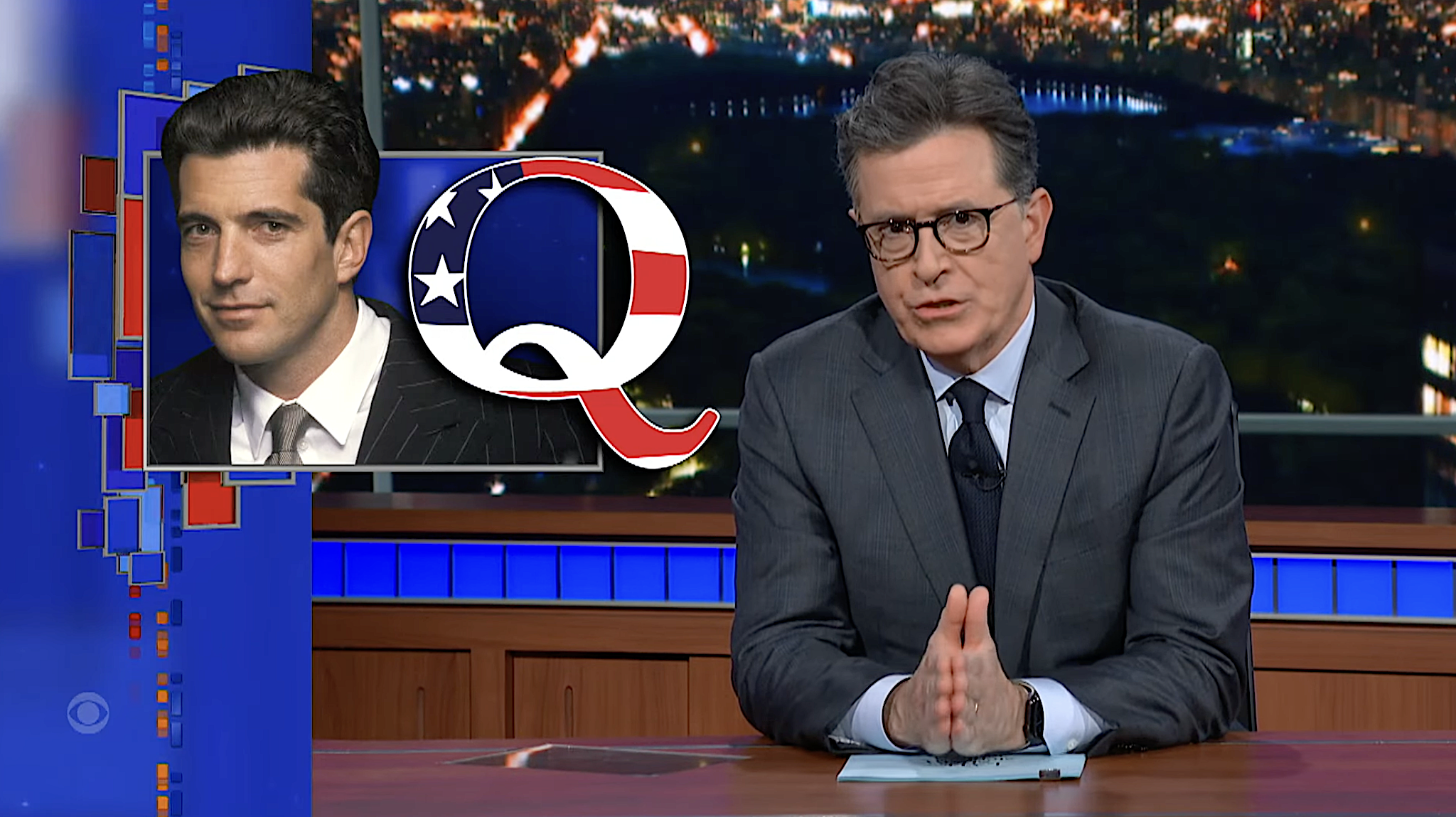Generation Q
An elaborate conspiracy theory from the darkest corners of the internet is spreading to the mainstream. Why do people believe in QAnon?

A free daily email with the biggest news stories of the day – and the best features from TheWeek.com
You are now subscribed
Your newsletter sign-up was successful
A version of this article originally appeared in The New York Times. Used with permission.
A City Council member in California took the dais and quoted from QAnon, a pro-Trump conspiracy theory about "deep state" traitors plotting against the president, concluding her remarks, "God bless Q."
A man spouting QAnon beliefs about child sex trafficking swung a crowbar inside a historic Catholic chapel in Arizona, damaging the altar and then fleeing before being arrested.
The Week
Escape your echo chamber. Get the facts behind the news, plus analysis from multiple perspectives.

Sign up for The Week's Free Newsletters
From our morning news briefing to a weekly Good News Newsletter, get the best of The Week delivered directly to your inbox.
From our morning news briefing to a weekly Good News Newsletter, get the best of The Week delivered directly to your inbox.
And outside a Trump campaign rally in Florida, people in "Q" T-shirts stopped by a tent to hear outlandish tales of Democrats' secretly torturing and killing children to extract a life-extending chemical from their blood.
What began online more than two years ago as an intricate, if baseless, conspiracy theory that quickly attracted thousands of followers has since found footholds in the offline world. QAnon has surfaced in political campaigns, criminal cases, merchandising, and at least one college class. Last month, hundreds of QAnon enthusiasts gathered in a Tampa park to listen to speakers and pick up literature, and in England, a supporter of President Donald Trump and Brexit leader Nigel Farage raised a "Q" flag over a Cornish castle.
Most recently, the botched Iowa Democratic caucuses and the coronavirus outbreak have provided fodder for conspiracy mongering: QAnon fans shared groundless theories online linking liberal billionaire George Soros to technological problems that hobbled the caucuses, and passed around bogus and potentially dangerous "treatments" for the virus.
About a dozen candidates for public office in the United States have promoted or dabbled in QAnon, and its adherents have been arrested in at least seven episodes, including a murder in New York and an armed standoff with police near the Hoover Dam. The FBI cited QAnon in an intelligence bulletin last May about the potential for violence motivated by "fringe political conspiracy theories."
A free daily email with the biggest news stories of the day – and the best features from TheWeek.com
Matthew Lusk, who is running unopposed in the Republican primary for a Florida congressional seat and who openly embraces QAnon, said in an email that its anonymous creator is a patriot who "brings what the fake news will not touch without slanting." As for the theory's more extreme elements, Lusk said he was uncertain whether there really was a pedophile ring associated with the deep state.
"That being said," he added, "I do believe there is a group in Brussels, Belgium, that do eat aborted babies."
The seepage of conspiracy theorizing from the digital fever swamps into life offline is one of the more unsettling developments of the Trump era, in which the president has relentlessly pushed groundless conspiracy theories to reshape political narratives to his liking. In promoting fringe ideas about deep state schemes, Trump has at times elevated and encouraged QAnon followers — recirculating their posts on Twitter, posing with one for a photograph in the Oval Office, inviting some to a White House "social media summit." Recently, during a daylong Twitter binge, Trump retweeted more than 20 posts from accounts that had trafficked in QAnon material.
QAnon began in October 2017, when a pseudonymous user of the online message board 4chan started writing cryptic posts under the name Q Clearance Patriot. The person claimed to be a high-ranking official privy to top-secret information from Trump's inner circle. Over two years and more than 3,500 posts, Q — whose identity has never been determined — has unspooled a sprawling conspiracy narrative that claims, among other things, that Trump was recruited by the military to run for office in order to break up a global cabal of pedophiles, and that special counsel Robert Mueller's investigation would end with prominent Democrats being imprisoned at Guantánamo Bay.
The anonymous posts subsequently moved to 8chan, where they remained until August, when that site was taken offline after the El Paso, Texas, mass shooting. They now live on 8kun, a new website built by 8chan's owner.
Some QAnon fans are hardened conspiracy buffs who previously believed other fringe theories, such as the bogus claim that the Sept. 11 terrorist attacks were an "inside job." But many QAnon adherents are everyday Americans who have found in Q's messages a source of partisan energy, affirmation of their suspicions about powerful institutions, or a feeling of having special knowledge. Some are older adults who discovered the theory through partisan Facebook groups or Twitter threads and were drawn in by the movement's promises of inside information from the White House (some QAnon devotees even believe that Trump posts himself, under the code name "Q+"). Others are seduced by the movement's wild, often violent fantasies, including claims that Hollywood celebrities are part of a satanic child-trafficking ring.
In online chat rooms, Facebook groups, and Twitter threads, QAnon followers discuss the hidden messages and symbols they believe to be exposed in Q's posts, or "drops" — for example, because Q is the 17th letter of the alphabet, a reference by Trump to the number 17 is seen as a possible signal of his support for them.
They watch Patriots' Soapbox, a YouTube call-in show devoted to coverage of QAnon, and other niche media projects that have popped up to fill the demand for Q-related content. Reddit barred a cluster of QAnon groups from its platform in 2018, after a spate of violent threats from members, and Apple pulled a popular QAnon app from its app store. But other social platforms, including Facebook, Twitter, and YouTube, still host large amounts of QAnon content. In general, these platforms do not prohibit conspiracy theories unless their adherents break other rules, such as policies against hate speech or targeted harassment.
The frequent introduction of new symbols and arcane plot points to dissect and decipher has given QAnon the feel of a theological study group, or a massive multiplayer online game. In interviews, several adherents described QAnon as a "lifestyle" or a "religion," and said it had become their primary source of political news and analysis.
"It's more of a cult than other conspiracy theories," said Joseph Uscinski, a political science professor at the University of Miami who studies fringe beliefs. "QAnon is not just an idea; it's an ongoing thing that people can sort of get into and follow along with that keeps them entertained."
With its core belief that the president is heroically battling entrenched evildoers, QAnon may be the ultimate manifestation of Trump-inspired conspiracy mongering. From the start, it was inexorably bound up with "Make America Great Again" communities online: The New York Times found last year that some 23,000 of Trump's Twitter followers had QAnon references in their profiles.
But QAnon has steadily migrated offline to Trump campaign rallies, where dozens of supporters can be found with Q paraphernalia, carrying signs and commiserating about the theory. In recent months, QAnon adherents have complained that security officials keep people from bringing their gear into the rallies; the campaign said it permitted only approved signs and licensed merchandise at its events.
Harry Formanek, a 65-year-old retiree who attended Trump's Florida rally in November wearing a QAnon T-shirt, said he learned about the theory after hearing allegations that top Democrats were running a child-sex ring out of a Washington pizza parlor — the hoax known as "Pizzagate," which was something of a precursor to QAnon. Now, he said, he spends roughly an hour a day on QAnon-related websites and believes, among other things, that Trump signals his support with Q-shaped hand gestures during public appearances. "My friends think I'm crazy," Formanek said. "I mean, the proofs are just undeniable."
With its growth in popularity, QAnon's tangible presence is not limited to clothes, bumper stickers, and campaign signs, all of which can be found for sale on Amazon and at other retailers. The theory also showed up at Mesa Community College in Arizona, where an adjunct professor of English, Douglas Belmore, began working it into classroom lectures. He was fired last summer after students complained.
Belmore announced his dismissal on Twitter, saying, "Why aren't more professors, teachers, cops, pastors, and woke Americans everywhere NOT talking about this?" Later, he tweeted, "I pray that you see The Truth about POTUS and Q and their War against the trafficking of children," and posted a video clip of Trump at a rally pointing to a baby wearing a Q onesie.
On the campaign trail during the past two years, at least six Republican congressional candidates, as well as several state and local politicians, have signaled some level of interest in QAnon. Danielle Stella, a Republican congressional candidate in Minnesota whose campaign's Twitter account has "favorited" QAnon material and used a QAnon-related hashtag, was suspended from the platform in November after suggesting that the Democratic incumbent, Ilhan Omar, be hanged for treason.
In an email responding to questions about her position on QAnon, Stella said through a campaign aide: "The decision to side with Twitter regarding my suspension for advocating for the enforcement of federal code proves that The New York Times and Twitter will always side with and fight to protect terrorists, traitors, pedophiles, and rapists."
In San Juan Capistrano, California, Pam Patterson, a City Council member, invoked QAnon in her farewell speech to the body in December 2018, reciting a Q posting as if it were Scripture. "To quote Q No. 2436," she said, "for far too long, we have been silent and allowed our bands of strength that we once formed to defend freedom and liberty to deteriorate. We became divided. We became weak. We elected traitors to govern us."
And in Montana, an elected justice of the peace, Michael Swingley, was reprimanded in November by a state judicial board for using his official email account to send an angry message to a journalist who had written an article skeptical of QAnon. Swingley wrote that, regardless of "whether Q is real," patriots were uniting because of it and "your world of fake news and liberal agendas that give away our country to foreigners and protect the Clintons and Obamas is coming to an end."
Beyond the mainstreaming of QAnon in certain Republican circles, a bigger concern for researchers who track conspiracy theories is the potential for violence by unstable individuals who fall under its sway, particularly in the fraught political climate of the 2020 election. In its intelligence bulletin identifying QAnon as a potential domestic terror threat, the FBI warned that partisan conspiracy mongering in the United States was being exacerbated by "the uncovering of real conspiracies or cover-ups" by political leaders. Social media was serving as an incubator for groundless theories and inspiring followers to take action, it said.
"Although conspiracy-driven crime and violence is not a new phenomenon," the bulletin said, "today's information environment has changed the way conspiracy theories develop, spread, and evolve."
Uscinski said that because some people with a conspiracy mindset are willing to entertain political violence, it was perhaps inevitable that as QAnon attracted a bigger following, it would eventually come to include a dangerous, if tiny, subset of adherents. "Once you reach a threshold of people," he said, "that particular apple is going to show up in the barrel."
-
 5 calamitous cartoons about the Washington Post layoffs
5 calamitous cartoons about the Washington Post layoffsCartoons Artists take on a new chapter in journalism, democracy in darkness, and more
-
 Political cartoons for February 14
Political cartoons for February 14Cartoons Saturday's political cartoons include a Valentine's grift, Hillary on the hook, and more
-
 Tourangelle-style pork with prunes recipe
Tourangelle-style pork with prunes recipeThe Week Recommends This traditional, rustic dish is a French classic
-
 Sound of Freedom brings the culture wars to the big screen
Sound of Freedom brings the culture wars to the big screenTalking Point A box office hit that critics say is 'QAnon-adjacent'
-
 Mysterious Georgia granite monument bombed, destroyed after GOP candidate called it 'Satanic'
Mysterious Georgia granite monument bombed, destroyed after GOP candidate called it 'Satanic'Speed Read
-
 Jon Stewart and the BBC's Gabriel Gatehouse try to explain QAnon's irrational allure
Jon Stewart and the BBC's Gabriel Gatehouse try to explain QAnon's irrational allureSpeed Read
-
 QAnon has now dragged the Rolling Stones into its Trump-JFK Jr. fantasy, and Stephen Colbert has questions
QAnon has now dragged the Rolling Stones into its Trump-JFK Jr. fantasy, and Stephen Colbert has questionsSpeed Read